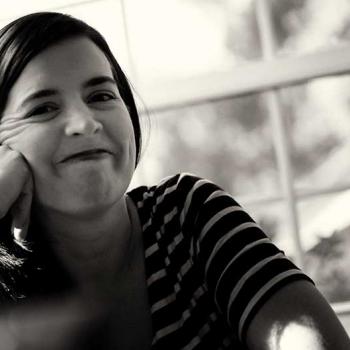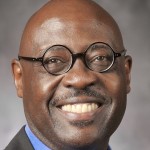By Rachel Paprocki
The 1975 pseudo-religious adventure comedy Monty Python and the Holy Grail, which I suspect and hope got most of us fumbling theology fans through the doldrums of middle school with its irreverent humor, sheds light on an uncomfortable thought I’ve been working on for some time: I don’t actually know everything, and neither do any of the people around me.
The scene is this: trouncing around medieval Europe, the cast of the Flying Circus finds itself in a world where the bodies of Plague victims are brought out to the curb for collection via wheelbarrow by Eric Idle, whether or not they properly belong there. One particularly resilient victim insists on not being dead yet: “I’m not dead yet. I’m gettin’ bettah!” he cries, flung over the shoulder of a family member clearly ready to be rid of him, whatever his state of convalescence. “I feel quite happy, I think I’ll go for a walk!” His arguments not convincing enough, his countrymen too used to people just up and dying, this poor chap is met with a blow to the head and a spot on the cart among his dead fellows.
The moral of the story (other than don’t get the Plague on the set of a Monty Python movie) is that when some conclusion is reached before its time (often all too easily—we’re in the habit of it), no one thinks to do anything else other than to go along with the status quo. We like to decide what things are and what they mean. If only there was some enlightened voice to help us mortal conclusion-reachers put on the brakes! I hope it is not too much of a reach to look to Monty Python for theological guidance along these lines: I identify now with the resilient plague victim; formerly, with his embittered kin. 
When I was in the shiny-happy stage of my Christian faith, between the ages of 18 and 21, I was more than happy to tell my classmates, mentees, roommates, and self that I had been cured of all the ills of depressive sadness and didn’t fear or ever anticipate their return, because I was confident I’d been redeemed and had always been taught that redemption is a forever-type thing. I’d determined the meaning (there could only be one of those or so) God had laid out for me to find, and I’d parade it around as testimony. To think otherwise was unreasonable, unfaithful. Then in the years immediately following that phase, when I was in the throes of major depression, I couldn’t even recall to my therapist what it was like to wake up in the morning in a neutral mood, let alone to consider hope in the future. Reality, I was certain, was unredeemed and forever-bad. Conceiving anything else was impossible, too painful.
These two opposite kinds of certainty are equally unhealthy. They’re also fairly impractical. I had not, in fact, solved all the mysteries of the world at age 20. Neither had I any idea about the nature of reality at 25. Too eager to draw conclusions about what my life and what my life with God meant, I had misestimated redemption. Now, actually, I think that if there is redemption, it has already happened, is happening now, and will also not be finished happening until some point in the future.
Not only am I not dead yet (instead with very much interest in feeling quite happy and wanting to go for a walk), but I’m also relatively certain that the rest of you are not yet dead, as well. None of us has finished living. More than a statement of the obvious, this is a theological truth that I recommend for your meditation queue.
Fortunately or unfortunately, having life (especially the having-it-to-the-full part) means that we have to (get to?) live. On the earth. In the real world. Today. Now (and also tomorrow, with enough worries of its own, still likely to catch us unawares). This means that, regardless of our beliefs on the existence of souls or the afterlife, as long as we assent Jesus’ statement that God was and is a part of human existence for our sakes, we also consent to participate in a state of constant flux. We might say that we know where we’re going, but the only thing we can say with certainty about that is we have no idea how it’s going to happen. Admitting that we’re not dead yet means acknowledging that we’ll die another way, by some other life circumstance, one that we don’t know. And perhaps that whatever redemption there is will precede, lead, and follow us.
Is this a problem? It might be, if we prefer to believe that we know what Divine promises are and how and when they will be fulfilled. And it certainly causes discomfort, though probably less so than being totally wrong in one way and then Gestalt-shifting to being totally wrong in another. Living with mystery (and God is one of those) means admitting (among many other things) that mental illness might come back, or that things might get much better. Both of those are pretty awful; both are better than winding up on the Plague cart, story curtailed. We are neither our illnesses nor their cures. We are creatures, acting and being acted upon, and I’d much rather enjoy that than pretend to understand it. Better to be interested in and to attempt forward motion than to throw hands up and pretend to be defeated.
How might we allow ourselves to be infinitely more open to being alive when we quit preemptively deciding that we know what’s up with the meaning of things? I have not yet gotten the corner on how to practice this open-hands style of living or of having faith, but I’ll report back when I have more than a suggestion. Now in the meantime, I am happy to admit that I’m not dead yet. I think I’ve done away with (at least temporarily) the part of myself that wants to pretend that my life means one thing or another, putting myself on the proverbial wheelbarrow. Someday, I’ll let you know what this was all about. But I must also offer the spoiler alert that that will happen when I am dead, and not a moment sooner.
Rachel Paprocki survived being raised in Murrieta, CA by knitting and reading voraciously. An alumna of Pepperdine University (BA, 2010) and Fuller Theological Seminary (MA, 2014), she has earned her keep with a year-long stint teaching English in northeastern China and then by making coffee in the greater Los Angeles area, which she traverses by bicycle. She is the managing editor of the the Fuller Writing Center.
You can follow Fuller Seminary on Twitter at @fullerseminary.













